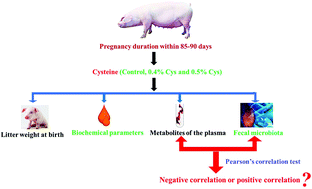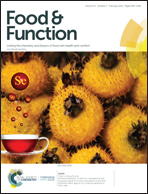The impact of different levels of cysteine on the plasma metabolomics and intestinal microflora of sows from late pregnancy to lactation
Abstract
Cysteine (Cys) is a semi-essential amino acid that is synthesized from methionine in mammals and affects their physiological state. This study aimed at investigating the effects of different Cys levels on the birth weight and survival rate of piglets as well as the plasma biochemical parameters, intestinal microbial diversity, and plasma metabolome of sows during late pregnancy. The results showed that 0.4% Cys supplementation increased the birth weight of piglets and decreased the calcium, triglyceride, and bilirubin levels in sows, whereas 0.5% Cys supplementation reduced the gamma-glutamyl transpeptidase levels and increased the serum glucose levels in sows at farrowing. Intestinal microbial analysis demonstrated that 0.4% Cys supplementation increased the diversity of fecal and intestinal microbiota compared with 0.5% Cys supplementation. In addition, plasma metabolomics identified 11 differential metabolites among the 0.4% Cys, 0.5% Cys, and control (basal diet) groups. The serum hypotaurine levels in sows increased by 0.4% and 0.5% Cys supplementation, and the serum acetylcysteine levels increased by 0.5% Cys supplementation; however, the differences in hypotaurine and acetylcysteine levels between the 0.4% and 0.5% Cys groups were not significant. Furthermore, Pearson analysis revealed a positive correlation between the hypotaurine levels and the abundance of Lactobacillus or Pseudobutyrivibrio and a negative correlation between the acetylcysteine levels and the abundance of Ruminococcaceae_UCG-014. Overall, the results indicated that 0.4% Cys supplementation increased the birth weight of piglets, increased the differential metabolites beneficial for combating antioxidative stress in embryos enhancing the intestinal microbial abundance in sows, and increased the diversity of fecal microbiota in sows. Thus, these findings suggest that 0.4% Cys supplementation is highly beneficial for maintaining the health of sows during late pregnancy.



 Please wait while we load your content...
Please wait while we load your content...